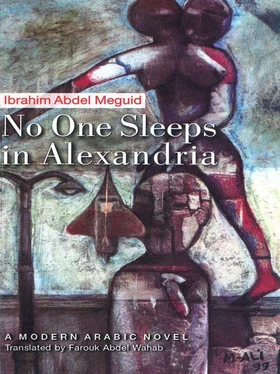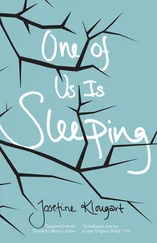Khawaga Dimitri paid ten pounds for the tomb and the burial expenses and told Magd al-Din in a whisper, “You can return it to me when things are better.” Magd al-Din was sure he could repay it, for his land in the village produced income, and he was sure his sisters would send him his share every season. What puzzled Magd al-Din was the affection show-ered on him and his wife by Khawaga Dimitri and his family even though they had only known each other for a few weeks. Sitt Maryam told Zahra, “Your brother-in-law was a prince.” “Dimitri told Magd al-Din, “Your brother was a good guy.” Magd al-Din surmised that Bahi must have done them some favors when the need arose. He told Zahra to empty Bahi’s room out so Khawaga Dimitri could have it back.
Nothing in Bahi’s room was needed, so the furnishings were sold to the secondhand-goods merchant in the morning. Magd al-Din took Bahi’s clothes and gave them away to the poor at the cemetery. Zahra found an envelope in the armoire containing twenty pounds and cried when she gave the money to Magd al-Din. Bahi was saving from shame before Khawaga Dimitri — Magd al-Din could now return the ten pounds Dimitri had loaned him so magnanimously.
Even though he had not asked about it, Zahra told her husband the story of how Bahi took part in the battle and how he died. She said she heard shouts on the street. At the time she was in Sitt Maryam’s room, and they looked out of the window. She saw Bahi moving as fast and as gracefully as a horse, brandishing his club, and he felled everyone he hit. He was completely different from the Bahi she had known. He was like a supernatural force, throwing men to the ground right and left. There were many peasants on his side, but the southerners were more numerous. Her eyes could only see Bahi. Just as the battle was about to end, after most of the southerners had cleared the street, a group of them appeared from one alley, heading straight for for one man, Bahi. All the clubs came down on his head. At once, she went down to the street screaming, but Bahi was already dead. It seemed that he looked at her as if he were asking her to be a witness to his courage. Magd al-Din asked her if the woman Bahiya had reappeared in the street since then, and Zahra said she had seen her only the day Bahi was killed. She had seen her that day, but did not believe it, and looking at Bahi, who had just been killed, she soon forgot about her.
Magd al-Din continued to go out to the cemetery every afternoon, giving money to the poor, and reciting the Quran. By nightfall, he would go back home and have supper, his only meal since breakfast, then he would recite the Quran until the night’s last prayer, when he would go to bed. He seldom spoke to his wife. He became even more silent when he began to notice one or more women in front of Bahi’s tomb, crying and placing roses and cactus flowers on the tomb. When he went closer, they would move away and leave without a word. He decided to discover the secret of those women, so he went to the undertaker in his shop across the street from the cemetery and asked him. The man smiled and said, “This is the first deceased whose relatives are all women. They come to me and I point out the tomb to them. I didn’t see them the day of the burial, but they haven’t stopped coming yet.” He fell silent for a moment then went on, “It seems he was a decent guy. The women give me money, generously.” Another pause, and then he said, “Strangely enough, a man came to me a few days ago and asked me about the tomb. I took him to it, and he immediately fell upon the woman who had come there just before him and beat her bad, dragged her by the hair, and he swore a sacred oath that he would, God forbid, divorce her.” He asked Magd al-Din if he knew anything about that man, and Magd al-Din left him without a reply.

“The only thing you know about me is that I am Dimyan Abd al-Shahid. But I know that you come from a good family and I too come from a good family. My grandfather used to own slaves — no lie. That’s what they say about him in our village, Dayrut. You’re from northern Egypt and I am from southern Egypt. There are many notables from the north and many from the south. And in both north and south, the poor are of course more numerous. Somebody’s got to take from somebody! Make sense? Do you hear me, Magd al-Din?”
“I hear you,” replied Magd al-Din, as he did every time Dimyan asked him. Dimyan was now passing by every morning to accompany him on their job hunt. On the days without work, which were usually more than the successful days, they would sit at the café by the bridge. Magd al-Din would buy the newspaper and astound Dimyan with news of the German submarines and torpedo boats that blasted the British ships then disappeared like demons into the waters of the Atlantic Ocean. Dimyan learned a lot about Magd al-Din’s life. The most important thing he learned was that Magd al-Din had been exempted from military service because he had memorized the Quran.
Dimyan was now calling Magd al-Din “Sheikh.” He once told him in jest that there was no law exempting those who memorized the Bible from military service. Then he laughed, “But who could memorize the Bible?”
Every time they met, Dimyan would tell Magd al-Din something about his life until the story was rounded out. He told him that one day, out of the blue, one of the village people announced that Mr. Baskharun was an infidel. Baskharun was Dimyan’s grandfather, not the great-great-grandfather who had owned slaves. Why was Mr. Baskharun an infidel? The accuser said that as a child, he had not been baptized. The truth was that there was a dispute between two families over a piece of land, and one of the adversaries was able to spread that rumor about Mr. Baskharun.
“What is baptism, Dimyan?”
“Baptism means becoming Christian. Without it a man stays in limbo, between heaven and hell.”
“That means nobody holds him accountable?”
“Exactly.”
Magd al-Din smiled and said, “How can that be bad for the person?”
“Of course it can. Don’t ask me how. But it’s a very difficult situation. I don’t know exactly the nature of the difficulty, but I feel it. It’s like falling off a mountain but never landing anywhere. You remain suspended in space, in total emptiness, neither hot nor cold, not even air of any kind. Do you know, Sheikh Magd al-Din, that that happened to me once?”
“You stood between heaven and hell?”
“Yes. I felt it when I rode an elevator. Only one time in my life I rode an elevator in a building in Manshiya. I was cleaning the roof of the building. It was very hard work. The roof was a pigsty. I couldn’t go down the stairs. Can you imagine? I was too exhausted. Anyway, I stepped into the elevator and pressed the button. It went down so fast that I felt I was in a place that had been emptied out completely. I remembered the story about heaven and hell and being stuck between them. If I hadn’t seen through the glass door each floor going by in front of me, I would’ve screamed in fright.”
Magd al-Din looked at him in amazement and admiration, and felt genuine warmth toward him. Dimyan continued his family’s story.
“My grandfather went to the church in Asyut, Dayr al-Muharraq, the largest church in Asyut, and brought back the priest who had baptized him as a child. He was a blind man on crutches. But nobody believed him because the priest himself had committed many sins in his youth before he entered the monastery.”
Magd al-Din, honestly wishing to learn, asked, “Is it necessary for a person to be baptized young?”
“It’s more proper. But, no. A person can be baptized any time. Baptism is very simple: the priest holds the child and plunges him into a marble basin filled with water. Of course there’s also music and hallelujahs and hosannas — it’s a real party!”
Читать дальше













